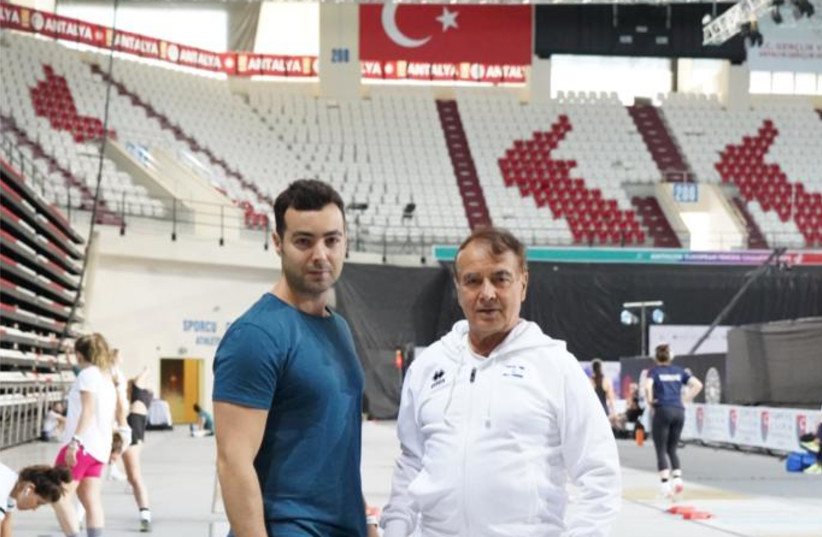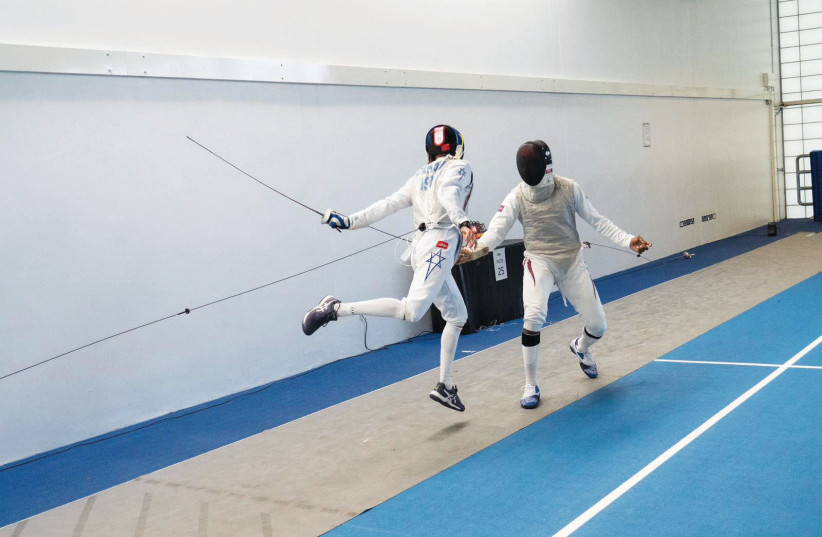When Yahli Dahan, 18, and his brother, Bari, 12, fight, they pick up their sabers and have a duel. Not really. However, the two brothers devote all their free time to improving their fencing skills at the Olympic Fencing Center in Acre.
The older brother was on the first-place Israeli fencing team in the Maccabiah Games this past summer. He also took third place in the individual fencing event and is now ranked No. 182 in the world. The younger brother is ranked No. 5 in his age group in Israel.
Yahli has fenced in Dubai and Europe and now has set his sights on qualifying for the Israeli team to participate in the 2028 Olympic Games in Los Angeles.
While fencing used to be a sport practiced only by the elite – training at a high level is very costly – there are now 19 fencing clubs in Israel, from Ma’alot in the North to Beersheba in the South.
Maor Hatuel is the Dahan brothers’ coach. He estimates that there are about 1,000 Israelis of all ages engaged in the sport.

When Hatuel’s father, Haim, founded the Olympic Fencing Center in Acre in 1971, it was the first fencing club in the periphery to train fencers to become good enough to compete at an international level. In fact, the Hatuel family is, Maor admitted, the symbol of fencing in Acre. (There is even an independent film, Fence Your Best, about the family which was made in 2017.) Maor’s sister, Delila, has represented Israel in World Championship competitions and participated in the Olympics in Beijing.
Maor sees the potential in the Dahan brothers and said he likes the fact that both brothers fence.
“The whole family can talk about fencing.”
Maor Hatuel
“The whole family can talk about fencing,” said Maor, who won first place in the Maccabiah Games this summer and is a nine-time Israeli national fencing champion.
He also travels with the fencing team to Dubai and around Europe. Wherever they go, said Yahli Dahan, they do nothing but fence.
“I was in London but didn’t get to see Big Ben,” he joked.
Dahan became interested in fencing when he was nine, after his parents divorced.
“I was looking for something to do in the afternoons,” he said, “and I liked knights and swords.” When his father, David Dahan, a landscape designer, took him to the fencing center in Acre, he loved it right away.
“It was a tool for me to escape and a way to express my feelings and my talent,” said Dahan.
Fencing: Physical chess
FENCING IS described as “physical chess.” Dahan explained that it is a discipline, and fencers must use both their minds and their bodies to succeed.
It is an ancient sport. There is a relief in a temple in Egypt, built by Ramses III in 1190 BCE, that depicts swordplay. By the end of the 1800s, the modern sport was developed. When the Olympic Games were revived in 1896, fencing was included.
Competitive fencing uses three swords: the foil, epée, and saber. Points are won by making contact with the opponent.
The Israeli sport has its share of triumphs, as well as traumas. In 1972, Andrei Spitzer, a coach of the Israeli fencing team, was murdered at the Munich Olympics along with 10 other Israeli athletes. The photograph of Spitzer in a sleeveless white T-shirt, handcuffed and standing by the window at the Olympic Village has become an iconic symbol of the tragic event.
Yahli Dahan plans to compete in the Olympics. As the first-place winner at the 15-and-under Israeli National Championship, he said it was like a rude awakening the first time he competed on an international scale.
“The level is so much higher,” he said. He saw how much he needed to improve.

During the COVID-19 lockdown, Dahan and his younger brother practiced on the roof of their father’s house.
The sport, said Yahli, requires coordination, self-awareness, physical strength and great speed.
“We run and learn to be light on our feet,” said Bari.
But those skills come at a hefty price. Yahli said that their parents spend NIS 5,000 each year on the brothers’ equipment alone.
“The cost at a professional and international level is high, and many athletes like me need external support in order to improve.”
Yahli Dahan
“The cost at a professional and international level is high, and many athletes like me need external support in order to improve,” he explained. He added that their sister, Aviv, who is in 11th grade and doesn’t fence, “is like our manager and helps us stay organized.”
The Israel Fencing Association provides some stipends, but Yahli still has to teach fencing to younger children and work in the landscape business with his father to earn enough money to compete.
Haim Hatuel, born in Morocco, moved with his family to Acre when he was 15. The day after his release from his service in the IDF, he saw an ad for a local fencing academy aimed at helping street kids. Hatuel’s son, Maor, said that he is now working with Acre’s mayor Shimon Lankri to establish a program geared toward Arab youth in the city. One Arab fencer from Acre, Aziz Shami, will represent Israel in the Coupe du Monde competition in Japan.
There is an organization in the United States, the Peter Westbrook Foundation, for example, that tries to introduce fencing to underrepresented youth. Peter Westbrook was the first African-American to win an Olympic fencing medal.
“Fencing is a tool to achieve life’s goals,” Yahli said. “I think that every child should practice a sport.”
Bari said that to be a committed sportsman, “you have to give up lots of things.” He said he has missed out on family events and gathering of friends because he has to go to fencing practice. But the sport helps him concentrate on his studies.
“When you do sports, you’re happy,” he said. “It helps me in life.”
